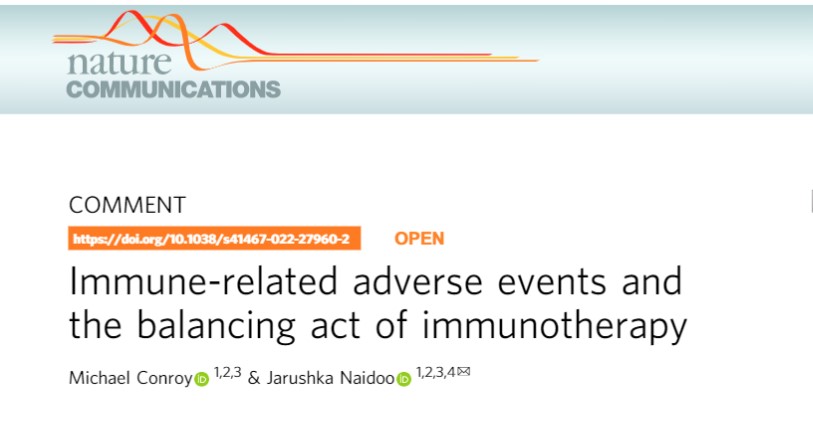
Michael Conroy1, Jarushka Naidoo1,2
- Beaumont RCSI Cancer Centre, Dublin, Ireland
- Sidney Kimmel Comprehensive Cancer Centre at Johns Hopkins University, Baltimore, MD,United States of America
Oncology treatments have historically been based around ‘cytotoxic’ chemotherapy, which targets cancers by killing rapidly dividing malignant cells. This is associated with a cadre of side effects caused by similar harm to rapidly dividing normal cells – hair loss, mouth ulcers, and infertility. One of the greatest recent developments in cancer care has been the use of immunotherapies – treatments that harness the body’s own immune system to kill cancer cells. These have been proven remarkably effective in some cancers, including lung cancer and melanoma, and show promise in many others.
These treatments tend not to cause significant hair loss, sores or nausea like traditional chemo. However, they are associated with a unique class of side effects termed ‘immune-related adverse events’, or irAEs. These are harms, which can affect any organ in the body, resulting from one’s own immune system being inadvertently driven to target body tissues.
These events are diverse in type, ranging from an underactive pituitary gland in the brain to inflammation in the muscle of the heart. They are also variable in time of onset, severity and mechanism. Some aspects are well-understood, such as the fact that these conditions typically respond to treatment with steroids – medications which reduce the activity of the immune system. However, some issues are less clear. The best means of diagnosing these problems are not known in many cases, and practice can vary among hospitals. It is not certain whether giving steroids for irAEs will lead to the cancer becoming active again, whether irAEs will be more common in patients who already have an autoimmune disease (like rheumatoid arthritis), and how to manage irAEs that do not respond to steroids.
More recently, evidence has been published to suggest that the micro-organisms that live in our gut (the gut microbiome) can influence whether tumours respond to immunotherapy, but also whether irAEs respond to treatment. In one interesting example, a transplant of stool from a healthy patient to two patients with severe immunotherapy-related colitis (bowel inflammation) led to the colitis resolving in both patients. It was suggested that the healthy micro-organisms from the donor led to improvement in the condition.
Therefore, this is an area of research with some areas of agreement but many areas of uncertainty. Knowledge regarding irAEs is developing very rapidly and this should help us in future to provide patients with the best available treatments while minimising their side-effects.
Click here to read the full article.
Categories
Latest News
-
May 8, 2024
-
March 26, 2024
-
February 19, 2024
-
January 30, 2024
-
January 24, 2024
-
January 10, 2024
-
January 22, 2024
-
January 31, 2024
-
November 27, 2023
-
October 3, 2023

